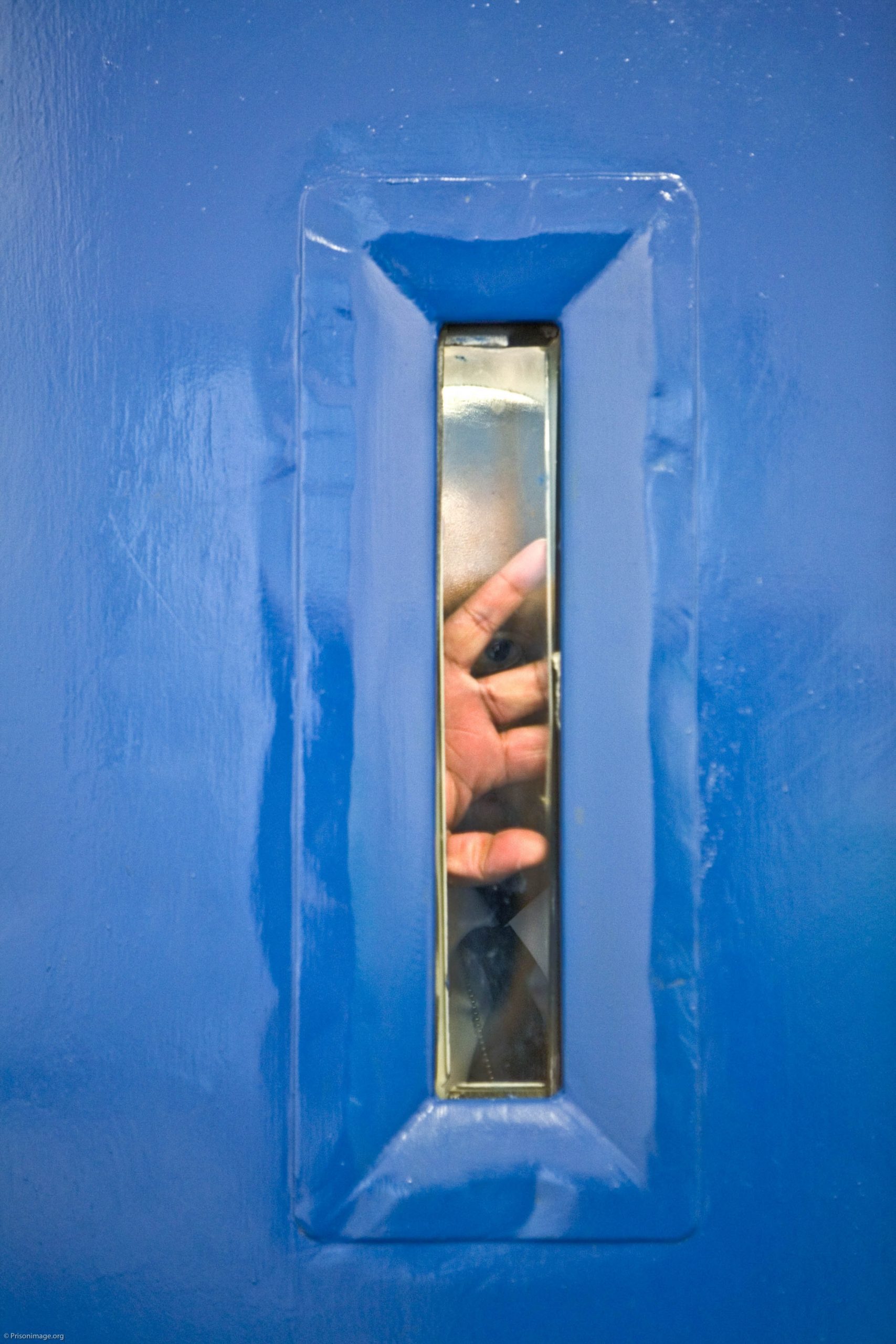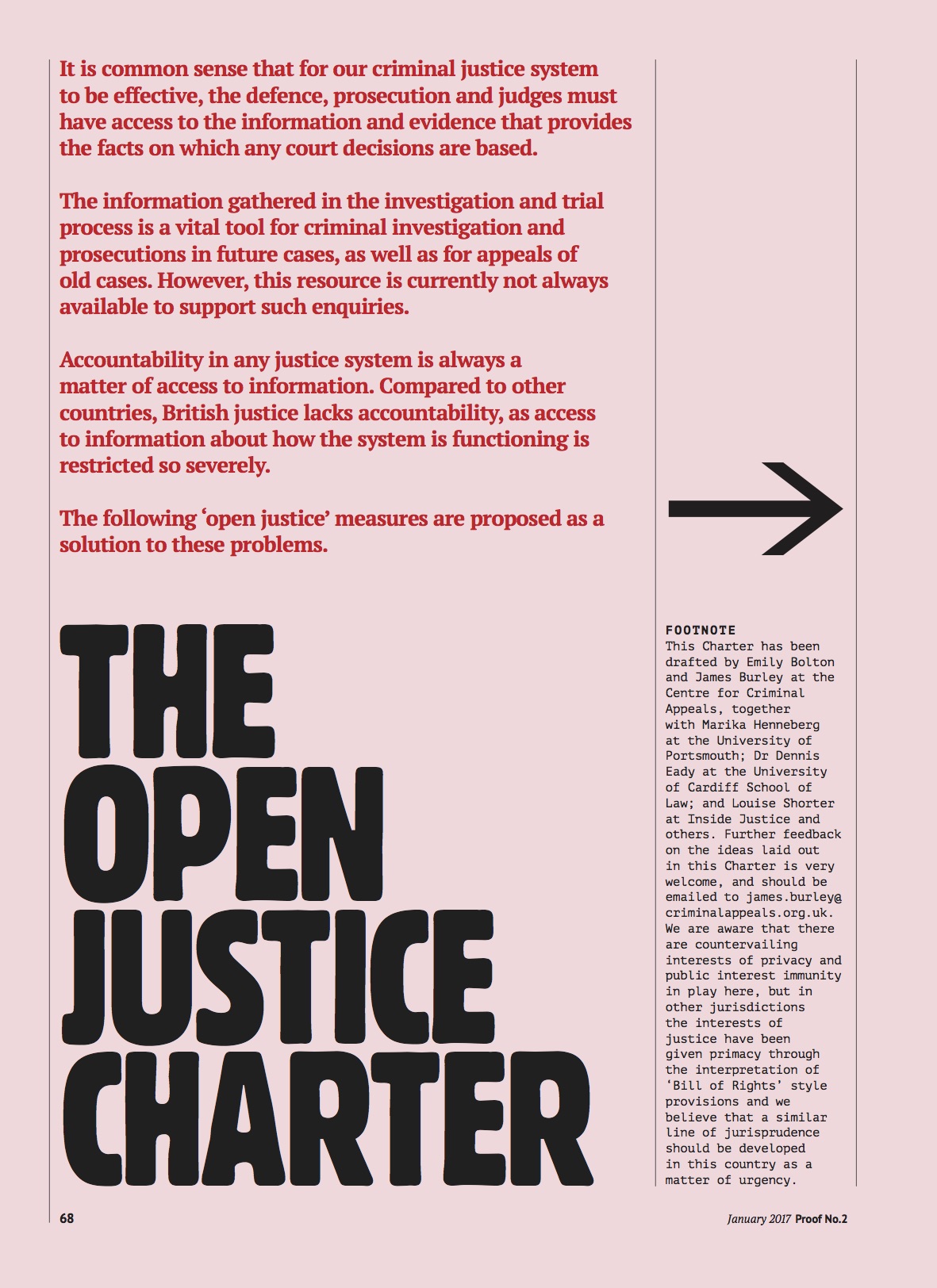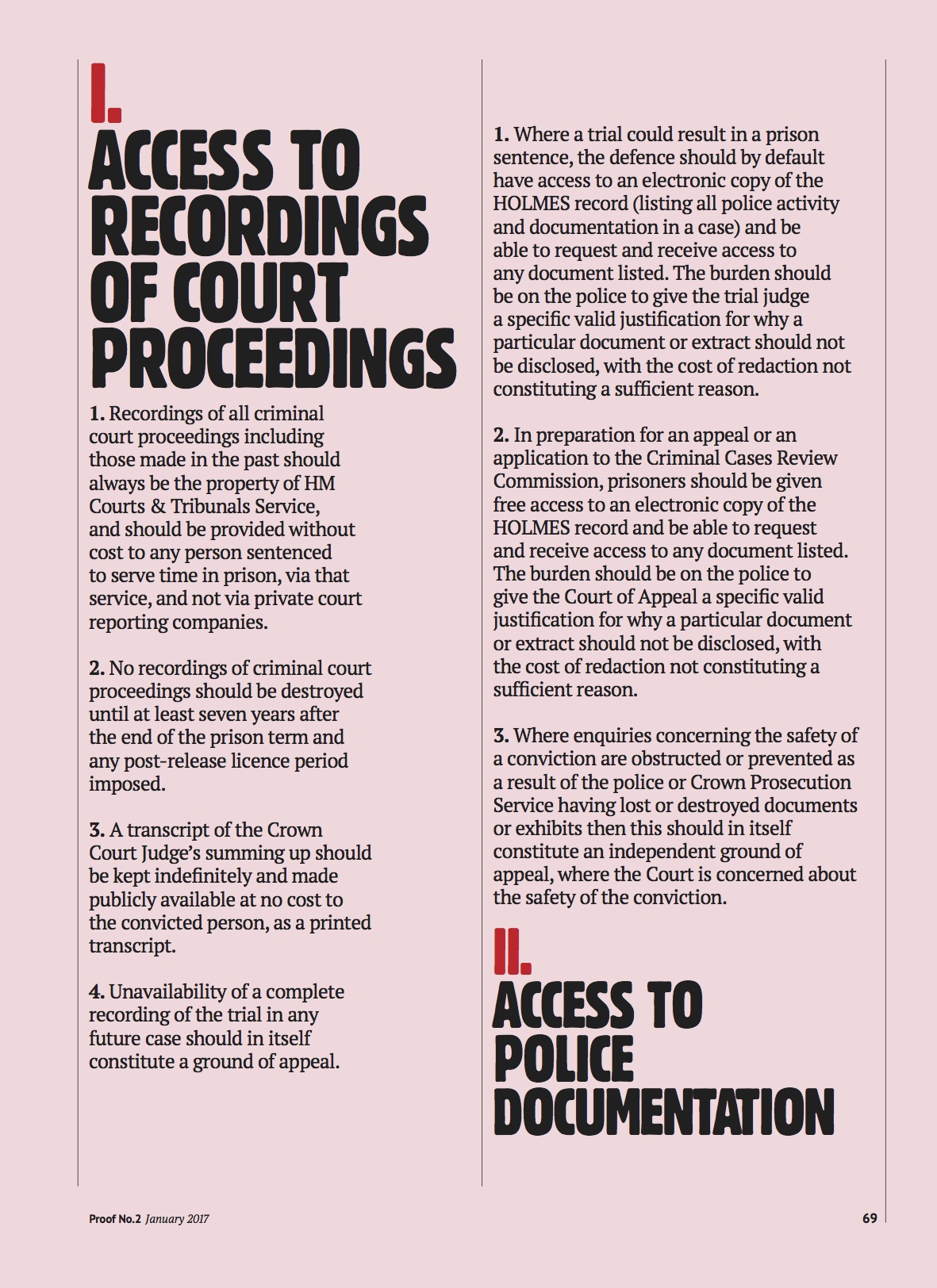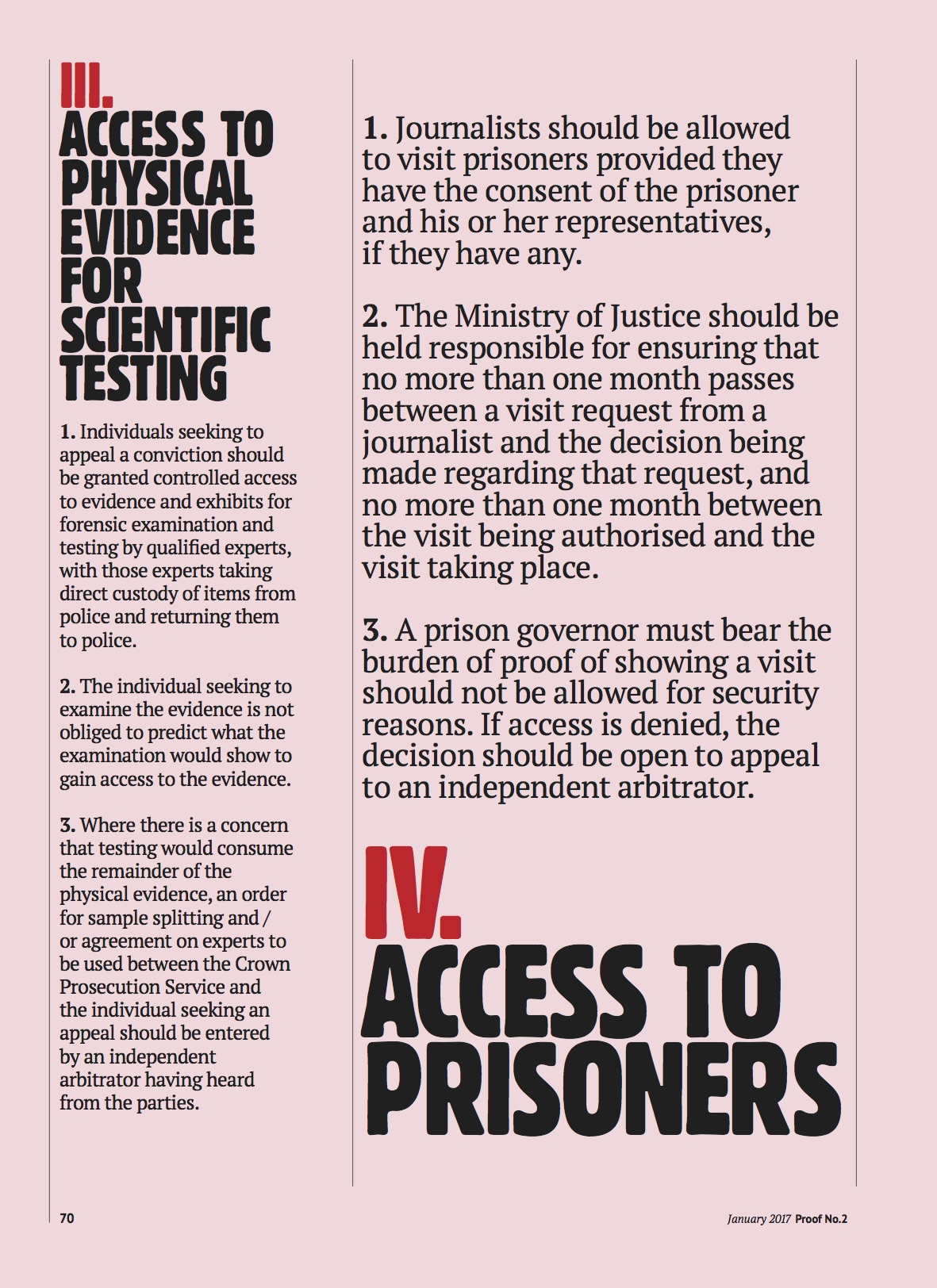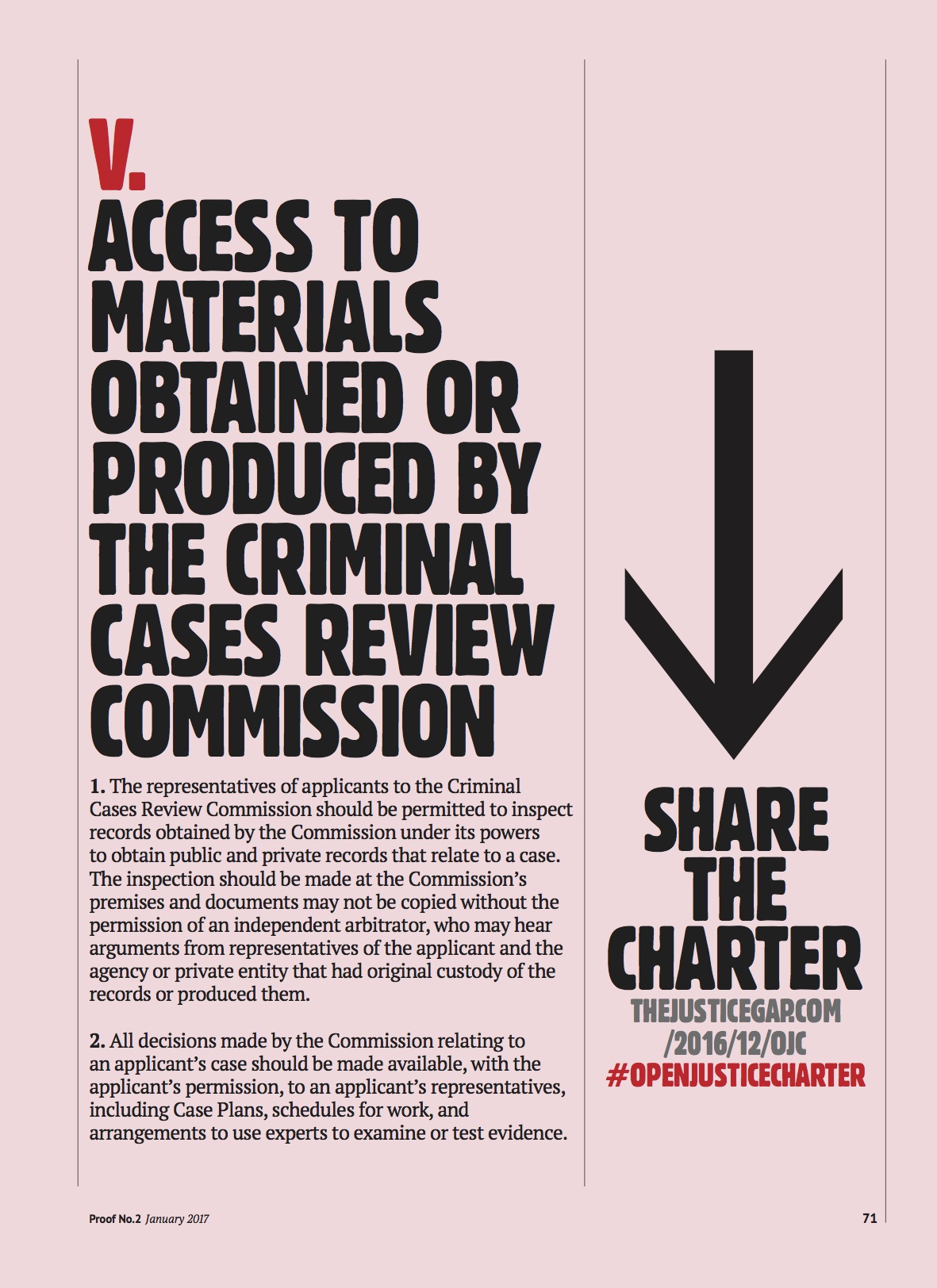OPEN JUSTICE CHARTER: A series of demands for greater transparency and openness in our justice system has been launched today. The Open Justice Charter has been drafted by a group of lawyers, academics and journalists working with the victims of miscarriages of justice and calls for greater access to the recordings of court proceedings and documents held by the criminal justice agencies, as well as access for journalists to prisoners.
The charter, which features in the latest issue of Proof magazine, has been drafted by Emily Bolton, founder at the Centre for Criminal Appeals together with Marika Henneberg from Portsmouth University, Dr Dennis Eady from Cardiff School of Law and the journalist Louise Shorter.
‘In the course of trying to identify who has been wrongfully convicted and who has not, we’ve been continually frustrated at the lack of transparency in the British justice system,’ said Bolton.
‘The steady stream of British justice is in danger of becoming no more than a trickle,’ commented human rights lawyer Michael Mansfield QC who acts for the Hillsborough families. ‘It has already been deprived of the necessary public funding for basic access and protection of rights. Equally important is access to the record of proceedings, and case documentation, without which injustice can be washed away.’
‘The biggest challenge to our justice system in recent years has been delivered by the Hillsborough inquests. That was accomplished by disclosure and re-examination of documents. Shining the light on such matters rarely comes from inside the system itself but from the tireless efforts of those on the outside, invariably the victims and survivors often empowered by intrepid journalists. The need for this charter is now more important than ever.’
Michael Mansfield QC
In the UK taped recordings of crown court hearings are never routinely transcribed for review by lawyers, and even the recordings are destroyed after five years, and digital recordings after seven years under Ministry of Justice guidelines (the courts went digital in 2011).
‘It is a complete roadblock to investigating miscarriages of justice,’ Emily Bolton said. ‘What is the British system afraid of? It’s a public trial, and there should be an accessible record of it.’
Last year Michael Mansfield QC, Paddy Hill of the Birmingham Six, a former deputy head of Hampshire CID, an ex Criminal Cases Review Commissioner, plus academics from 13 universities called on the then Lord Chancellor Michael Gove to stop the ‘reckless and irresponsible’ practice of automatically destroying the records of Crown Court trials in an open letter published on the Justice Gap.
‘This is not simply a matter of justice, but of history,’ the Independent on Sunday argued in a leader on the campaign. The more that we preserve of the workings of our judicial system ‘the more we will know about our society, and the more our descendants will be able to know’, the paper reckoned. ‘But the argument is primarily one of justice,’ it continued. ‘One of the founding principles of British justice is that its deliberations take place in public.’
In an interview for Proof magazine Dean Strang, one of the lawyers who acted for Stephen Avery and who featured in the Netflix documentary Making a Murderer, said he was ‘shocked’ to learn that our courts routinely destroy court transcripts and recordings. ‘The putative justification for that would simply have to be the cost of storage, right? That seems easily and overwhelmingly offset by the possible advantages,’ he said. ‘It’s trivial compared to the value of preserving the record of court proceedings.’
Richard Bourke, a death penalty defense attorney, and Calvin Duncan, who spent over 28 years imprisoned in Louisiana for a murder he did not commit, also criticised England and Wales’ lack of freely available transcripts of court proceedings and the lack of access to police and prosecution files. They insist these practices, which have been long-abandoned in the US, make it next to impossible to identify and to correct miscarriages of justice.
In the US, those seeking an appeal have had a right to a full transcript of their trial for decades. None only is there no such right in England and Wales, but private transcription firms often charge exorbitant fees meaning that defendants are almost always left to rely on the judge’s summing up to work out what happened at trial .
Duncan, who worked for years as a jailhouse lawyer, said relying on a summing up meant it ’just wouldn’t be an appeal at all’. ‘You and I could hear the same testimony and come back and reach different conclusions as to what we heard and we’d write it differently,’ he added.
In the US, police and prosecution files on a given case typically become a public record after a conviction is secured. In England and Wales, however, defendants have no subsequent right of access to information held by police forces or the CPS about their case.
Bourke insisted that at his law practice frequently the only way to prove individuals are innocent has been to review these files, adding: ‘It’s not a slur on the law enforcement offices that there needs to be checks and balances.’
Jailhouse lawyer
In 1985, aged just 19, Calvin Duncan was sentenced to life without parole for a murder with which he had nothing to do, based solely on a single, dubious eyewitness identification. He spent a total of 28 and a half years imprisoned at the Louisiana State Penitentiary, known more commonly as ‘Angola’ – a reference to the slave plantation that formerly stood on its site.
While incarcerated, Duncan learned law and acted as inmate substitute counsel – a jailhouse lawyer – for hundreds of prisoners, including those on death row. He was described as “the most brilliant legal mind in Angola” by journalist and former prisoner Wilbert Rideau.
In 2011, Duncan’s release from prison was secured by Innocence Project New Orleans. The non-profit law office was founded in 2001 by Emily Bolton and has secured the release of 28 wrongly convicted prisoners to date. Bolton has now established the Centre for Criminal Appeals, a charity and legal aid law practice, that aims to overturn wrongful convictions in England and Wales.
Since release, Calvin has worked as a paralegal, studied for an undergraduate qualification and and provided counselling, housing and financial support to several former prisoners – and he is heading for law school.
‘I’d rather be wrongfully convicted in New Orleans than New Malden’
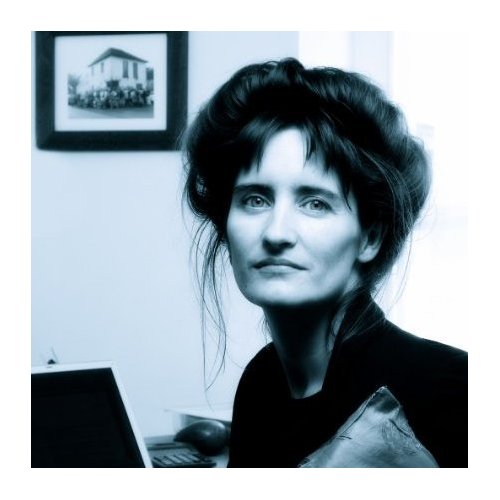 Emily Bolton, founder of Innocence Project New Orleans and now legal director of the Centre for Criminal Appeals, a London-based charity that challenges wrongful convictions, on the Open Justice Charter
Emily Bolton, founder of Innocence Project New Orleans and now legal director of the Centre for Criminal Appeals, a London-based charity that challenges wrongful convictions, on the Open Justice Charter
Why launch an Open Justice Charter now? In the course of trying to identify who has been wrongfully convicted and who has not, we’ve been continually frustrated at the lack of transparency in the system. It is a complete roadblock to investigating miscarriages of justice. As a former US practitioner, I am totally flummoxed about how lawyers have represented their clients on appeal without an automatic right to a transcript here – it has been available in the US since 1956. What is the British system afraid of? It’s a public trial, and there should be an accessible record of it. ’Public’ does not mean ‘lawyers’ or ‘rich people’. We knew that prisoners, academics and journalists were similarly frustrated at this lack of open justice, and thought it was important to set out a list of common-sense transparency demands on paper.
Isn’t the quality of British justice world-renowned, making these reforms unnecessary? I would rather be wrongfully convicted in New Orleans than New Malden. British Justice simply has not come under the same scrutiny as American justice because of the crazy limitations on access to the documents you need to check to make a system accountable. The American appeal courts are able to correct the system’s mistakes – but in this country the Court of Appeal is being deprived of the information it needs to ‘problem solve’ the system here – it has become dangerously disempowered.
The big problem in England and Wales is that no one is investigating the accused person’s side of the story before the trial. And sometimes, it is true. This is especially true in an era of legal aid cuts, which have seen the equality of arms that should exist between prosecution and defence undermined significantly. We know that serious disclosure failures by the CPS are an all-too frequent occurrence – and its because the cuts to their budget mean that their lawyers simply don’t have the time to check case paperwork thoroughly. We know from high profile examples such as Hillsborough that police cover-ups do happen. Shunning transparency would be to stick our heads in the sand.
Doesn’t the public miscarriage of justice review body, the Criminal Cases Review Commission, have powers to access police and CPS files already? Yes, it does. But it doesn’t have the funding to deploy those powers. Neat, huh? The CCRC is a gravely under-resourced body struggling to keep on top of its increasing caseload. It is like saying: ‘We have transparency because one person is allowed to read ten billion pages of information.’ How is that one person ever going to get around to it? They are not. The Commission staff do not have the time to obtain and review files in the depth necessary to uncover serious failures and wrongdoing. The only way to guarantee true accountability is to ensure that those seeking an appeal and their representatives have access to the documents behind the conviction and the time to read them. We have set up the Centre for Criminal Appeals as a charity with more resources than just legal aid to make sure that at least in some cases, there are lawyers who are allowed to take the time to do this job properly.
Why should the public want open justice reforms? Because they expect that the institutions they entrust so much power to – the police, the CPS, the courts – can actually be held accountable. Without open justice, the police operate with impunity. And they are overworked, underfunded, occasionally venal and always and only human. As a result, injustices are going uncorrected and we have no way of knowing where mistakes and wrongdoing have occurred. Frankly, it’s embarrassing that we’re lagging behind states in the US like Louisiana and Mississippi when it comes to open justice. The British public deserve better. Any of us can say we know we won’t commit a crime, but we cannot say for sure we won’t be wrongfully accused of one.

